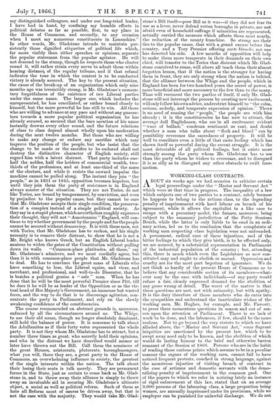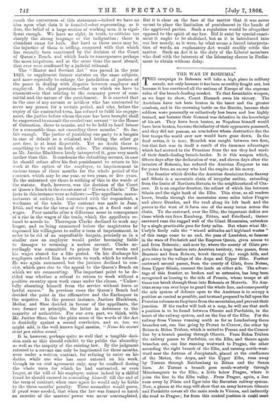WORKING-CLASS CONTRACTS.
ABOUT six weeks ago we had occasion to criticize certain legal proceedings under the " Master and Servant Act " which were at that time in progress. The inequality of a law which subjects one of two parties to a contract, solely because he happens to belong to the artizan class, to the degrading penalty of imprisonment with hard labour on breach of his agreement, while it allows the capitalist in a like case to escape with a pecuniary mulct, the former, moreover, being subject to the summary jurisdiction of the Petty Sessions Bench, while the latter is only liable to be sued in an ordi- nary action, led us to the conclusion that the complaints of working men respecting class legislation were not unfounded. A permanent, radical cure of these injustices, and of the bitter feelings to which they give birth, is to be effected only, we are assured, by a substantial representation in Parliament of the industrial population of the country ; but, attending this, there is much which even the Legislature as now con- stituted may and ought to abolish or amend. Oppression and cruelty are for the most part begotten of ignorance. We do not think so hardly of the present House of Commons as to believe that any considerable section of its members—what- ever may be the case with individuals—of any party would refuse a fair, clearly expressed demand for the abolition of any gross wrong of detail. The worst of the matter is that these questions are met, not with animosity, but with apathy. It is the duty therefore of those members who do enter into the sympathies and understand the inarticulate wishes of the working men, Mr. Hughes, for example, and Mr. Fawcett, to press these momentous questions in season and out of sea- son upon the attention of Parliament. There is no lack of work to be done, and the labourers, if few, should be the more zealous. Not to go beyond the very statute to which we have alluded above, the " Master and Servant Act," some flagrant iniquities are sanctioned by the present law, which to be swept away need only to be known, and the abolition of which would do lasting honour to the brief and otherwise barren remnant of the Session of 1866. Persons who are in the habit of reading those curious prints which assume to be in a peculiar manner the organs of the working men, cannot fail to have noticed frequent protests, couched in strong language, against the monstrous injustice of visiting breach of contract in the case of artizans and domestic servants with the demo- ralizing penalty of imprisonment in the common gaol. One of the papers to which we refer in noticing lately an instance of rigid enforcement of this law, stated that on an average 9,000 persons of the labouring class, a large proportion being women, are annually imprisoned under its provisions, while no employer can be punished for unlawful discharge. We do not
vouch the correctness of this statement—indeed we have no idea upon what data it is founded—but representing, as it does, the belief of a large section of working men, it is signi- ficant enough. We have no right, in truth, to criticize too sharply the strong language or the indignation ; there is abundant cause for both. But hard as these cases may be, the injustice of them is trilling, compared with that which has recently been sanctioned by the decision of the Court of Queen's Bench, and which leads to consequences perhaps the most iniquitous, and at the same time the most absurd, that ever were confirmed by a judicial tribunal.
The " Master and Servant Act " was passed in the year 1823, to supplement former statutes on the same subjects, and more especially to enlarge the jurisdiction of justices of the peace in dealing with disputes between employer and employed. Its chief provision—that on which we have to comment—is that relating to the summary power of com- mittal and the nature of the punishment. It is enacted that in the case of any servant or artificer who has contracted to serve any person for a certain period, and who, before the expiry of the contracted term, has refused to fulfil his engage- ment, the justice before whom the case has been brought shall be empowered to commit the recalcitrant servant " to the House of Correction, there to remain, and to be held to hard labour for a reasonable time, not exceeding three months." So far, fair enough. The justice of punishing one party to a bargain in case of default as a criminal, and letting the other go scot free, is at least disputable. Yet no doubt there is something to be said on both sides. The statute, however, as Mr. Justice Blackburn lately interpreted it, goes very much farther than this. It condemns the defaulting servant, in case he should refuse after his first punishment to return to his work at the option of the employer, to imprisonment in various terms of three months for the whole period of the contract, which may be one year, or two years, or five years. To the unlearned eye there is nothing of this in the words of the statute. Such, however, was the decision of the Court of Queen's Bench in the recent case of " Unwiu v. Clarke." The facts in this instance were as follows :—The appellants, manu- facturers of cutlery, had contracted with the respondent, a workman of the trade. The contract was made in June, 1865, and was for the term of two years, at a fixed rate of wages. Four months after a difference arose in consequence of a rise in the wages of the trade, which the appellants re- fused to accede to. Thereupon Clarke declined to work any longer, and on being summoned before the magistrates he expressed his willingness to suffer a term of imprisonment, in order to be rid of an unprofitable bargain, precisely as in a similar case an employer would prefer becoming liable to damages to retaining a useless servant. Clarke ac- cordingly was committed to prison for three weeks and his wages abated for a like period. On his discharge his employers ordered him to return to work, which he refused. He was again summoned, but the justices declined to con- vict, which gave rise to the appeal to the Queen's Bench on which we are commenting. The important point to be de- cided was whether a refusal to return to work without a positive re-entry upon work came under the clause, "Unlaw- fully absenting himself from the service without leave or lawful excuse." In previous cases the Queen's Bench had decided the point in the affirmative and the Exchequer in the negative. In the present instance, Justices Blackburn, Mellor, and Shee decided in favour of the appellants, the two former on principle, the latter in deference to the majority of authorities. For our own part, we think, with Mr. Justice Shea, that the plain sense of the words of the Act is decidedly against a second conviction, and so, too, we might add, is the well known legal maxim, "Nemo bis vexari debet pro eddern cause."
It is, however, perhaps quite as well that a tangible deci- sion such as this should exhibit to the public the absurdity as well as the iniquity of the existing law. By the judgment referred to a servant can only be imprisoned for three months, even under a written contract, for refusing to enter on his duties, while one who has once entered on his work, though on an oral agreement only, may be confined during the whole term for which he had contracted, or even longer, at the will of his employer, unless indeed by a skilful fraud he should succeed in concealing himself till the end of the term of contract, when once again he would only be liable to the three months' penalty. These anomalies would prove, if proof were needed, that when the law was framed so harsh an exercise of the masters' power was never contemplated. But it is clear on the face of the matter that it was never I meant to place the limitation of punishment in the hands of the aggrieved parties. Such a regulation would be altogether opposed to the spirit of our law. Did it exist by special enact- ment it ought to be abolished, but as it is introduced into our law merely, as it were, by what seems a forced interpreta- tion of words, an explanatory Act would readily settle the matter. Such an Act it is the duty of the Liberal members who deal with the interests of the labouring classes in Parlia- ment to obtain without delay.































 Previous page
Previous page